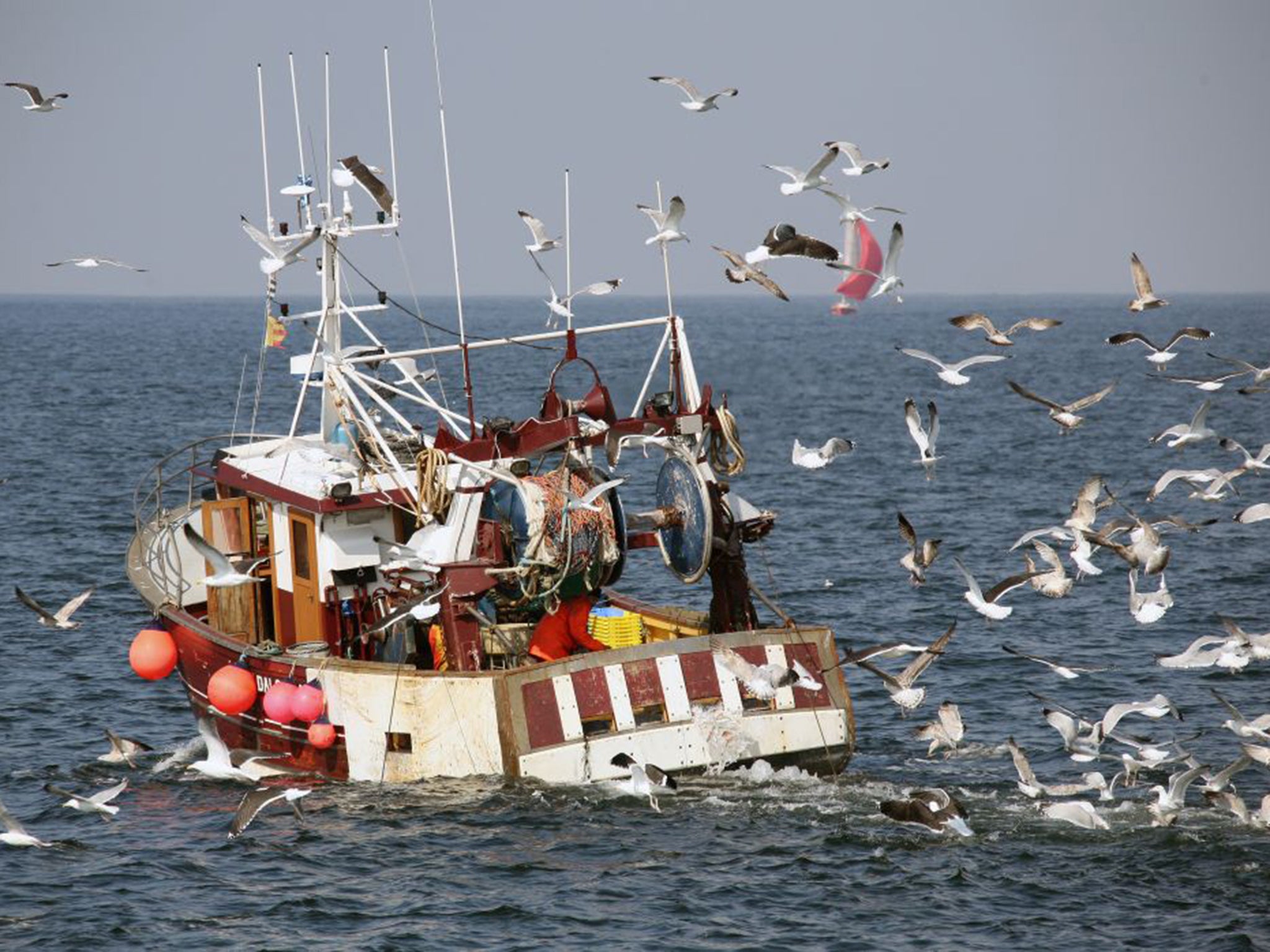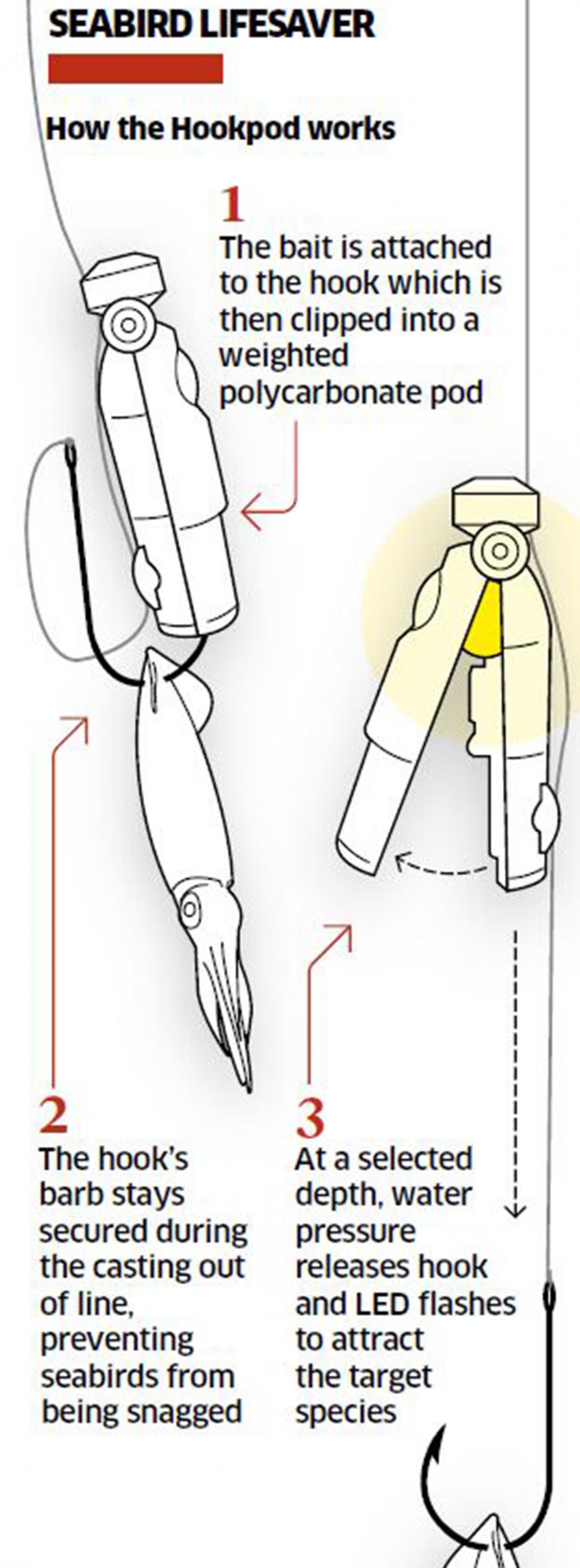Hookpod: Mariners hail seabird-saving hi-tech hook
Conservationists hailed the success of the trials as 'absolutely brilliant'

Your support helps us to tell the story
From reproductive rights to climate change to Big Tech, The Independent is on the ground when the story is developing. Whether it's investigating the financials of Elon Musk's pro-Trump PAC or producing our latest documentary, 'The A Word', which shines a light on the American women fighting for reproductive rights, we know how important it is to parse out the facts from the messaging.
At such a critical moment in US history, we need reporters on the ground. Your donation allows us to keep sending journalists to speak to both sides of the story.
The Independent is trusted by Americans across the entire political spectrum. And unlike many other quality news outlets, we choose not to lock Americans out of our reporting and analysis with paywalls. We believe quality journalism should be available to everyone, paid for by those who can afford it.
Your support makes all the difference.Every year an estimated 300,000 seabirds – including 100,000 of one of the world’s largest flying birds, the albatross – are accidentally killed by the fishing industry.
But a British company, set up by conservationists to find a way to reduce this annual slaughter, believes it has finally found a solution after seven years of work.
Trials of the Hookpod, which will be reported in a scientific journal in the coming weeks, found that it was just as effective at catching fish as an ordinary hook, but almost guaranteed that no seabirds would be killed.
Conservationists hailed the success of the trials as “absolutely brilliant” and a Brazilian fishing boat captain, who was involved in the trials, has already decided to continue using Hookpods voluntarily.
The device works by encasing the hook in a plastic pod, which is opened by water pressure at a set depth, once it is safely out of reach of diving seabirds.

Marine biologist Becky Ingham, the chief executive of Devon-based Hookpod Ltd, said: “We are really incredibly confident that if people are using this correctly, they will never catch birds because it removes the hook from where the birds can get it. It’s pretty much idiot-proof… We think it’s the answer. It’s an exciting time for us now.”
The pelagic long-line fishing fleet sets billions of hooks a year, targeting high-value species, particularly tuna. But in the process it is believed to account for about a third of all seabirds killed by the fishing industry – known as bycatch. Unintended victims include petrels, shearwaters and albatrosses.
The latter are extraordinary animals: they can live for more than 60 years, mate for life and have been known to fly around the world in just 46 days. The great albatrosses (Diomedea) have the largest wingspan of any living bird, reaching up to 3.5m (11ft 6in) across.
However, they can take up to 10 years to reach breeding age and tend to produce just one egg every two years, so the loss of a mature adult is a significant blow to the population. Eight out of 22 albatross species, which are found in every ocean except the North Atlantic, are now endangered or critically endangered, and the rest are all showing signs of trouble.
During trials off Brazil, South Africa and Australia, fishing lines were fitted with Hookpods and conventional hooks to enable the company’s researchers to put their invention to the test.
Ms Ingham said: “Since we have done these trials, we have only had one bird ever caught on a Hookpod and the observer on the boat actually saw the pod fly open when it left the boat so it had not been deployed correctly. Pods deployed correctly have never caught a bird.”
While the Hookpods caught one bird, the ordinary hooks killed 25.
The other key consideration was whether the Hookpods would actually catch fish. “What we’ve found is there’s no statistical significance in the difference between the two treatments in the catch,” Ms Ingham said. “There’s no difference in terms of the size of the fish or the numbers caught.”
The Hookpod includes a second innovation: an LED light to attract the fish, which avoids the need for single-use chemical glowsticks which are thrown into the water and are a source of marine pollution. Another smaller version without a light is also being developed.
A number of different methods to avoid seabird bycatch have been used before, such as setting streamer lines above the surface and using weights to make the hooks sink quickly, but not all fisheries require these measures. The Hookpod is designed to be a single, cost-effective measure that fishermen would actively want to use.
Celso Rocha de Oliveira, the Brazilian fishing boat captain, wrote about his experience using Hookpods: “In my opinion, the Hookpod is a mitigation measure more efficient than bird-scaring lines, line weighting and night setting [fishing]. It’s a pleasure to help to develop this technology, which in my point of view is the solution to preventing seabird bycatch in pelagic long-line fisheries.”
When told about the results of the trials, Dr Cleo Small, the head of BirdLife International’s marine programme, said: “That’s absolutely brilliant to hear.”
BirdLife was involved in setting up the project before it was turned into a private company, with crowdfunding and a significant investment from an individual whose main interest was saving the albatross.
Dr Small said the albatross was a “symbol of healthy oceans” but also of “how much damage we can do, sometimes unintentionally”.
She said Samuel Taylor Coleridge’s 1798 poem, The Rime of the Ancient Mariner, in which the seaman’s killing of an albatross dooms him and his crewmates, could have been written as an allegory for our times.
“It certainly has become that and perhaps that is why there is this connection with the British public,” Dr Small said.
“It’s very powerful how the albatross have caught the imagination of people in the UK, even though they are so far away.”
Join our commenting forum
Join thought-provoking conversations, follow other Independent readers and see their replies
Comments